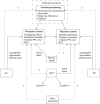Contextual Processing and the Impacts of Aging and Neurodegeneration: A Scoping Review
- PMID: 33658771
- PMCID: PMC7917362
- DOI: 10.2147/CIA.S287619
Contextual Processing and the Impacts of Aging and Neurodegeneration: A Scoping Review
Abstract
Contextual processing (or context processing; CP) is an integral component of cognition. CP allows people to manage their thoughts and actions by adjusting to surroundings. CP involves the formation of an internal representation of context in relation to the environment, maintenance of this information over a period of time, and the updating of mental representations to reflect changes in the environment. Each of these functions can be affected by aging and associated conditions. Here, we introduced contextual processing research and summarized the literature studying the impact of normal aging and neurodegeneration-related cognitive decline on CP. Through searching the PubMed, PsycINFO, and Google Scholar databases, 23 studies were retrieved that focused on the impact of aging, mild cogniitve impairment (MCI), Alzheimer's disease (AD), and Parkinson's disease (PD) on CP. Results indicated that CP is particularly vulnerable to aging and neurodegeneration. Older adults had a delayed onset and reduced amplitude of electrophysiological response to information detection, comparison, and execution. MCI patients demonstrated clear signs of impaired CP compared to normal aging. The only study on AD suggested a decreased proactive control in AD participants in maintaining contextual information, but seemingly intact reactive control. Studies on PD restricted to non-demented older participants, who showed limited ability to use contextual information in cognitive and motor processes, exhibiting impaired reactive control but more or less intact proactive control. These data suggest that the decline in CP with age is further impacted by accelerated aging and neurodegeneration, providing insights for improving intervention strategies. This review highlights the need for increased attention to research this important but understudied field.
Keywords: Alzheimer’s disease; EEG-ERP; Parkinson’s disease; aging; behavior; contextual processing; dementia; mild-cognitive impairment.
© 2021 Tran et al.
Conflict of interest statement
The authors report no conflicts of interest in this work.
Figures


Similar articles
-
Neural evidence for defective top-down control of visual processing in Parkinson's and Alzheimer's disease.Neuropsychologia. 2017 Nov;106:236-244. doi: 10.1016/j.neuropsychologia.2017.09.034. Epub 2017 Sep 30. Neuropsychologia. 2017. PMID: 28974380
-
Patterns of Physical Activity and Sedentary Behavior for Older Adults with Alzheimer's Disease, Mild Cognitive Impairment, and Cognitively Normal in Hong Kong.J Alzheimers Dis. 2018;66(4):1453-1462. doi: 10.3233/JAD-180805. J Alzheimers Dis. 2018. PMID: 30412502 Free PMC article.
-
Visual Event-Related Potentials in Mild Cognitive Impairment and Alzheimer's Disease: A Literature Review.Curr Alzheimer Res. 2019;16(1):67-89. doi: 10.2174/1567205015666181022101036. Curr Alzheimer Res. 2019. PMID: 30345915 Review.
-
Auditory Event-related Potentials in Mild Cognitive Impairment and Alzheimer's Disease.Curr Alzheimer Res. 2018;15(8):702-715. doi: 10.2174/1567205015666180123123209. Curr Alzheimer Res. 2018. PMID: 29359668 Review.
-
COWAT Performance of Persons with Alzheimer Dementia, Vascular Dementia, and Parkinson Disease Dementia According to Stage of Cognitive Impairment.PM R. 2019 Jul;11(7):737-744. doi: 10.1002/pmrj.12125. Epub 2019 May 7. PM R. 2019. PMID: 30746867
Cited by
-
Representational maps in the brain: concepts, approaches, and applications.Front Cell Neurosci. 2024 Mar 22;18:1366200. doi: 10.3389/fncel.2024.1366200. eCollection 2024. Front Cell Neurosci. 2024. PMID: 38584779 Free PMC article. Review.
References
-
- Hasher L, Zacks RT. Working memory, comprehension, and aging: a review and a new view. Psychol LearningMotivation. 1988;Jan(22):193–225.
Publication types
MeSH terms
LinkOut - more resources
Full Text Sources
Other Literature Sources
Medical
Miscellaneous

